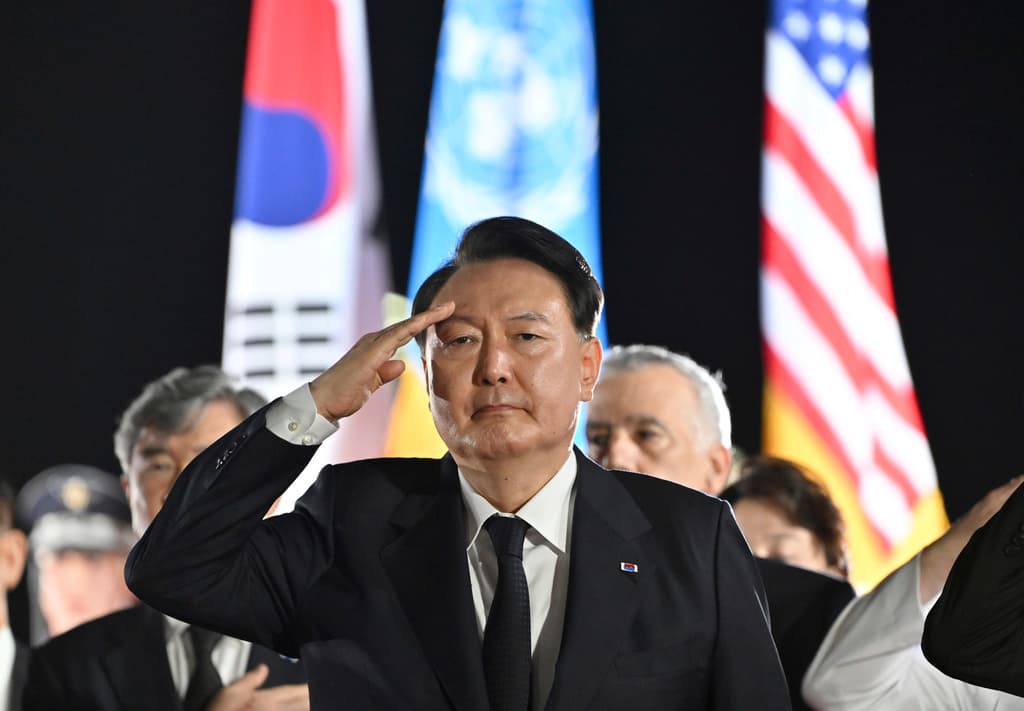Trump’s Election Triumph Adds to Anxiety in South Korea and Ukraine Over North Korea and Russia
Congratulatory messages to the president-elect from Presidents Yoon and Zelensky mask fears the 47th president could compromise with, or yield to, their enemies.

President-elect Trump’s victory Tuesday is raising anxiety levels in South Korea and Ukraine for the same reasons — doubts about where he’ll stand on the defenses against North Koreans and Russians.
Both Presidents Yoon of Korea and Zelensky of Ukraine were quick to dispatch congratulatory messages to Trump that masked fears that he will compromise with, or yield to, their enemies while denying the large amounts of aid needed for defense in war and peace.
“Look forward to working closely with you,” Mr. Yoon said in his message, predicting the alliance between Washington and Seoul “will shine brighter.” Mr. Zelensky, congratulating the president-elect on his “impressive election victory,” recalled their “great meeting” at Washington two months ago, “when we discussed in detail the Ukraine-U.S. strategic partnership, the Victory Plan, and ways to end Russian aggression.”
Trump’s victory could hardly have come at a more dramatic moment in terms of the war for Ukraine: Just as North Korean troops fired their first shots as part of a concerted Russian-led push to capture portions of the Kursk region in eastern Ukraine, recently wrested from the Russians by Ukrainian forces.
Trump, in his victory speech, “made no mention of Ukraine yet alluded to just how consequential his second term in office will likely be for the country ravaged by Russia’s invasion,” a news editor with the English-language Kviv Independent, Chris York, noted, asking: “How does Trump plan to stop Russia’s war against Ukraine?”
That, his article said, is “the million-dollar question.” The question was just as urgent in South Korea, which North Korea’s party boss, Kim Jong-un, has declared the “enemy” and threatened to attack with nuclear-tipped missiles.
While Mr. Kim supports Russia in Ukraine with troops as well as artillery shells and other weapons, President-elect Trump may not find him nearly as receptive to talking as he was when they “fell in love” during their first summit, at Singapore in June 2018.
The bromance flickered when President Trump walked out on their second summit, at Hanoi in February 2019. They met a third time four months later at Panmunjom on the North-South line and have exchanged more than 20 “love” notes.
The president-elect “may dust off his diplomacy toolbox and pursue another summit with Kim, but the chances of reaching a deal are lower this time than during his first term,” South Korea’s Yonhap News said. If Mr. Kim were to consent to seeing Trump again, “he would attempt to negotiate U.S. recognition of North Korea as a nuclear state and seek subsequent concessions for ‘nuclear disarmament,’ rather than ‘denuclearization.’”
A former senior American diplomat at Seoul and Tokyo, Evans Revere, was still more emphatic in response to the Sun’s questions. “Kim Jong Un wants a lot more than sanctions easing,” he told the Sun. He “sees an opportunity to exploit Trump’s naivete and ego and trap him into a deal that effectively accepts the DPRK [Democratic People’s Republic of Korea] as a de facto nuclear state by launching ‘arms control’ talks, and also puts U.S nuclear and conventional assets and the U.S.-ROK alliance on the table.”
North Korea, Mr. Revere said, “has no intention of freezing or otherwise limiting its nuke program.” As for Ukraine, he said Mr. Putin “surely opened the expensive champagne this morning when he heard the news of the electoral outcome.”
Predicting a Trump “peace proposal” for Ukraine, Mr. Revere said “the price of peace” will be “concessions to Russia that give it at the negotiating table what it has not been able to achieve on the battlefield.” South Korea, he added, faces “increased threat from North Korea, thanks to Putin’s desire to reward Kim Jong-un for his troop contribution with high-tech weaponry and missile technology.”
South Koreans are also concerned about President Trump’s demands for Seoul to pay Washington billions of dollars more than the present nearly $1 billion a year for the 28,500 American troops stationed on American bases in the South. President Trump during his first term questioned the need to have the Americans in Korea and canceled joint exercises with South Korean forces.
Mr. Yoon, after the president-elect declared victory, phoned the NATO secretary-general, Mark Rutte, who said “North Korean troops are expected to engage in combat against Ukraine within days,” Yonhap reported.

